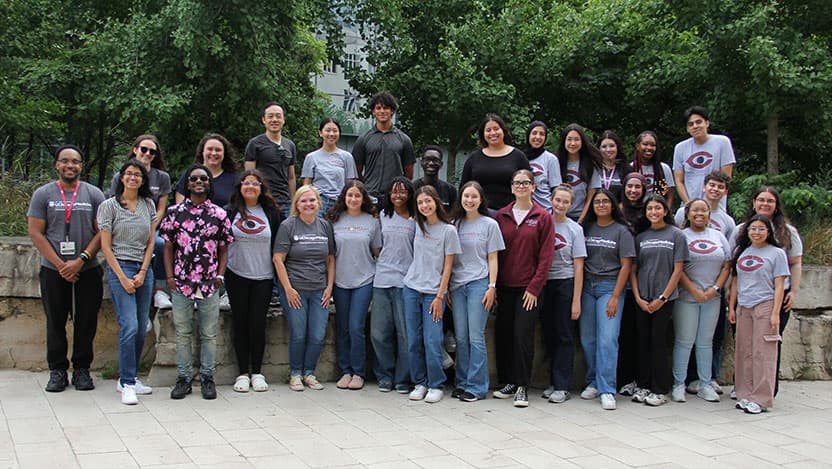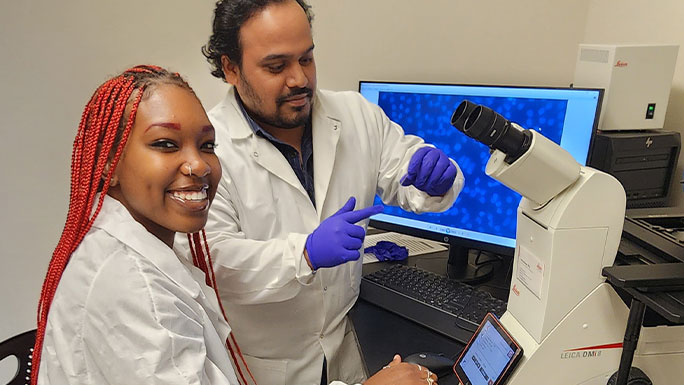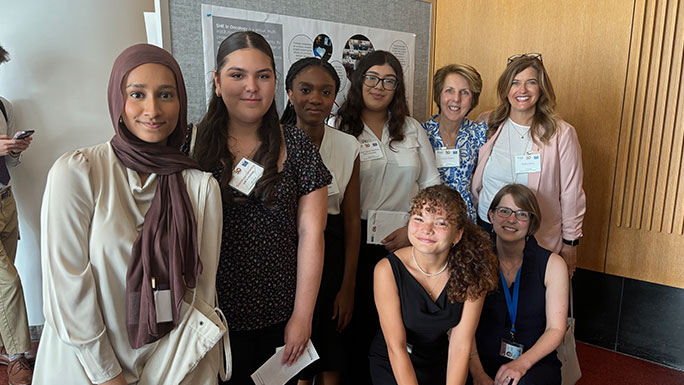UChicago Medicine receives $2.8 million to empower underrepresented students in cancer research

The University of Chicago Medicine Comprehensive Cancer Center (UCCCC) has been awarded a $1.5 million grant from the National Cancer Institute (NCI) and a $1.3 million grant from the National Institute of General Medical Sciences (NIGMS) to expand two pioneering cancer research pathway programs: Chicago EYES (Educators and Youth Enjoy Science) on Cancer and SHE (Summer Healthcare Experience) in Oncology. The programs strive to increase diversity and equity in the cancer research field, a key strategy to reduce health disparities in the Chicagoland area and across the country.
Advancing health equity through education and mentorship
Chicago EYES on Cancer was founded in 2017 and was among the first programs to receive funding through the NCI Youth Enjoy Science grant. The program is an intense, two-year research training experience that engages high school and college students, as well as science educators, from Chicago’s underserved communities. Under the guidance of internationally renowned experts, trainees contribute to cutting-edge cancer research to develop critical skills in the biomedical sciences. They also receive personalized mentorship to prepare for careers in cancer research.
Eileen Dolan, PhD, Professor of Medicine and Deputy Director of the UCCCC, and Megan Mekinda, PhD, UCCCC Director for Education, Training, and Evaluation, serve as co-principal investigators for the grant. Co-investigator Sonia Hernandez, PhD, Research Associate Professor in the Department of Surgery, will lead outreach efforts to trainees’ families and local schools.
“We started with only a few students, and now we've helped dozens of students by providing them research experiences and mentorship over their two years in the program,” Dolan said. “One of the greatest joys of my career is watching these talented students learn skills and gain confidence in the laboratory and go on to illustrious careers themselves.”
EYES trainees benefit from a wide range of resources, including monthly skill-building workshops, career exploration opportunities, and community outreach activities in partnership with local institutions such as Chicago Public Schools and the Griffin Museum of Science and Industry. EYES offers educators the tools to incorporate their research experience into classroom curricula, expanding the program’s impact to students across Chicago Public Schools.
To date, EYES has positively impacted 70 student trainees and 14 educators from underserved communities in the Chicago area. With renewed funding, the program will continue to serve at least 25 participants per year. Ninety-six percent of EYES alumni remain committed to STEM careers, and over a third are pursuing opportunities in cancer-related fields.

“This program has opened up many, many opportunities for me,” says EYES trainee Marcy’Anna Murphy, who started the program the summer after high school graduation. “I’ve been in the same lab for two years, and we are in the process of trying to publish. I’m a co-author on the paper, which is a really awesome experience. I’ve also met so many different people from so many different backgrounds. There’s no cookie-cutter sample to be a scientist. There’s no cookie-cutter anything. This is what these past two years have shown me.”
Empowering young women in STEM
SHE in Oncology is a two-week virtual program designed specifically to inspire high school women from underrepresented backgrounds to explore careers in cancer research. This unique program is offered through a network of five top cancer centers: UCCCC, Abramson Cancer Center at the University of Pennsylvania, Markey Cancer Center at the University of Kentucky, Rogel Cancer Center at the University of Michigan, and Livestrong Cancer Institutes at the University of Texas at Austin. Programming is delivered collaboratively and synchronously across the five sites, connecting trainees to an expansive network of peers, mentors, and opportunities in cancer research and care. The program’s multi-institutional structure also creates rich context for the study of social determinants of health, barriers to care, and other factors undermining cancer health equity within the centers’ respective catchment areas and participants’ own communities.

SHE was launched in 2021 with funding from the American Cancer Society, enrolling 76 young women program-wide. In 2022, the model was adopted by a second cohort of five cancer centers, growing the program’s reach to a total of 13 states with slots for up to 200 trainees. New funding from the NIGMS Science Education Partnership Award allows for the continued enhancement of SHE, including year-round skill-building opportunities, formalized support for program alumni, and rigorous evaluation to validate and strengthen the SHE program model for further expansion.
Mekinda is the principal investigator of SHE in Oncology. She oversees all aspects of the program in collaboration with Dolan, who is the co-investigator.
“Early interventions are key to engaging more women in STEM-related careers,” Mekinda said. “Particularly important are those that foster belonging, self-efficacy, and expectations of success, combined with support for scientific skill development. The SHE program accomplishes exactly this, leveraging the strengths of a virtual platform to reach young women from communities nationwide.”
Guadalupe Camarena was a participant in the 2024 SHE program. “As a first-generation student, being a part of SHE in Oncology has opened my eyes to the endless possibilities of careers in the STEM field,” Camarena says. “Participating in such an empowering environment has allowed me to engage in daily lectures, research projects, panel discussions, and learn more about the science behind cancer. For students interested in pursuing a career in science and medicine, I can proudly say that SHE in Oncology is the perfect place to start.”
Commitment to promoting equity and diversity in the cancer workforce
Chicago EYES on Cancer and SHE in Oncology are part of the UCCCC’s longstanding investment in future generations of cancer researchers and clinicians. This past summer marked 10 years of cancer research pathway programs to deepen trainees’ knowledge of cancer science, broaden their awareness of careers in the field, and build relationships with leaders in the scientific community who are unraveling cancer’s mysteries. The UCCCC’s offerings also include the Diversity in Cancer Research (DICR) program for undergraduates, funded by the American Cancer Society, and researcHStart, a multi-institutional program for high school students from Chicago and Urbana-Champaign. Collectively, the programs have served over 300 young people, the majority of them from underrepresented populations.
Samuel G. Armato, PhD, Professor of Radiology, helps lead these initiatives in his role as UCCCC Associate Director for Education.
“These programs are a cornerstone of the Cancer Center’s mission of connecting the next generation of cancer researchers with world-class mentors among the UChicago faculty,” Armato said. "We are proud of the accomplishments attained by past participants, and we eagerly anticipate the successes of future participants in these impactful programs.”
Communities in Chicago suffer from multiple health disparities, particularly for cancer. Among the South Side’s 800,000 residents, the majority of whom are Black and historically marginalized, cancer mortality rates are twice that of residents north of the city.
“The UCCCC is deeply committed to fostering diversity in cancer research through innovative education and community outreach initiatives,” said UCCCC director Kunle Odunsi, MD, PhD. “These programs, which have helped establish the UCCCC as a national leader in cancer education and training, prepare up-and-coming cancer researchers to recognize and address health disparities present in their own communities.”
With continued support from the National Institutes of Health, American Cancer Society, and philanthropic donors, the UCCCC will expand and sustain opportunities for members of diverse communities throughout the country to make meaningful contributions to cancer research and care.
Funding: Chicago EYES on Cancer and SHE in Oncology received grants from the National Cancer Institute (R25CA221767) and the National Institute of General Medical Sciences (R25GM154352), respectively.

UChicago Medicine Comprehensive Cancer Center
UChicago Medicine is designated as a Comprehensive Cancer Center by the National Cancer Institute, the most prestigious recognition possible for a cancer institution. We have more than 200 physicians and scientists dedicated to defeating cancer.
Learn More About the Comprehensive Cancer Center